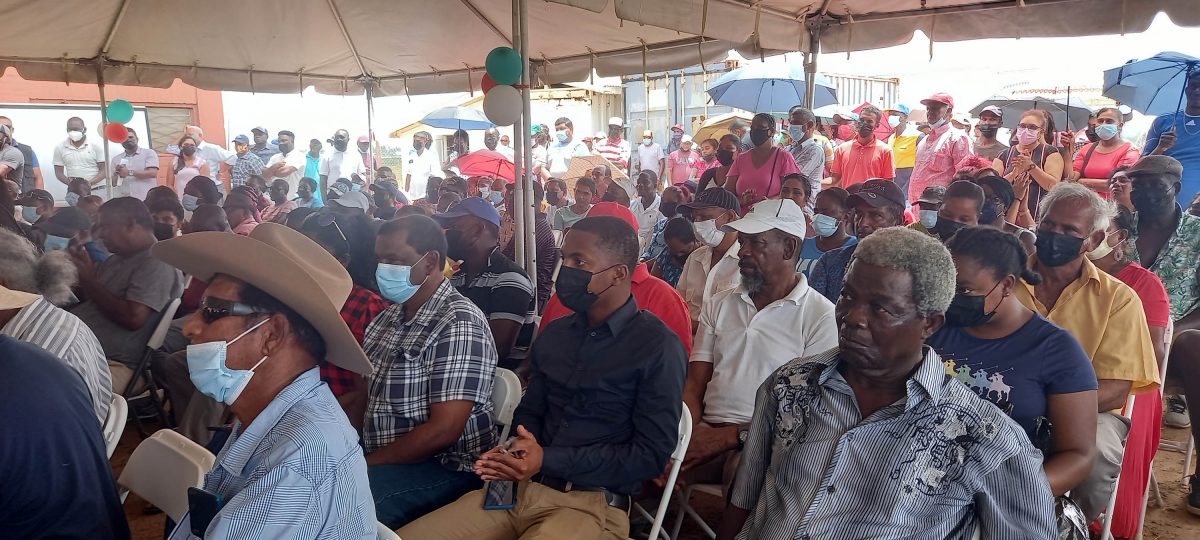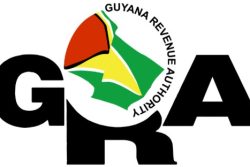President Irfaan Ali yesterday launched a major Black Belly Sheep Project in Region Five, West Coast Berbice which has 78 farmers on board already with an additional 1,000 black belly sheep expected to arrive from Barbados in the coming weeks.
With an initial investment of US$3M, President Ali presented a detailed plan with a series of slides to farmers at Onverwagt, West Coast Berbice on how the government plans to build the industry to maximum potential. He said that Region Five will become the livestock capital of the country.
Stressing that the project goes beyond just building the farms, he then stipulated that at least 20% of the farms must be led by women and 35% by youths – persons below the age of 35.
According to the President, the vision for the project is first to be “self-sufficient” – supply locally – then move on to supplying regionally, and then onto the international stage.
Target
Ali yesterday explained that the project will need an overall investment of US$175M from the government, farmers, and international players.
In his over 60-minute presentation, he pointed out that the target is to increase local production above 7,000 tons by the end of year five, as according to him this is a realistic target given the investment.
The President projected 4500 jobs, directly and indirectly.
Ali also detailed projected production to years 10 – 20 and financial projections.
Pointing out that 78 farmers have already signed up with land that they want to be a part of the project, he then encouraged others to come on board explaining that after Region Five is examined the other communities will be built to target the gap.
Farmers in the project are expected to develop the pastures with grass and legumes, while the Guyana Livestock and Development Authority (GLDA) will provide technical and veterinary services.
However, Ali stressed that the sheep farmers and GLDA will have to collaborate to ensure that accurate data is provided and proper monitoring of animal performance promptly is done.
Touching on the opportunities which will come with the industry, Ali said that the world import value for mutton products is US$8B which is 1.2 billion metric tons “and it is a growing market.”
He then highlighted that Caricom imports 7,900 tons to the tune of US$48M and is being supplied by Australia and New Zealand. He noted that the four major markets for small ruminants in Caricom are The Bahamas, Jamaica, Trinidad and Tobago and Barbados.
“We have already agreed with Barbados that Guyana and Barbados would do a joint project to supply the Barbados market strictly from Guyana to start with, that is a market with a value of US$6.8m, and to show you how fast we are moving two weeks from now our breeding stock for Barbados Black Belly would be enhanced by 1,000. That flock is coming to Region Five to support you here”, President Ali said.
He pointed out that in Guyana 18 metric tonnes are being imported to the tune of US$130,000, adding that this market will also grow with the investment being made, further stressing, that “this is a project that is supported by scientific research, market research and strong negotiation on the trade side.”
In terms of the present structure of the industry, Ali said that the predominant breed here is the black belly of which Region Five accounts for 65%. “What we want to do is to work with all the farmers to develop a consistent system”, stressing that once they are developing an industry they must have consistency, the similarity of technology, and similarity of the system “because we have to build a mechanism that will support a singular system.”
He said in terms of research, technology, capital, the market system, the reproduction system, the feeding system, the pasture “all of these will undergo tremendous change with an investment from the government so that we can have the highest possible output from every single farmer and pasture.”
Adding to that, he told the large gathering of farmers that they will be supported with the machinery to bring the pastures to the highest possible level after which they will be helped with the necessary technology. “This is part of the input from the government in supporting the development.”
Meanwhile, according to Ali, they have assessed the historical evolution of the sector identifying the weakness, challenges, threats and opportunities so that they can build a strong and resilient sector.
Calling the small-ruminant industry, the “sleeping giant”, President Ali said that they are going to awaken it.
Ali then highlighted a series of constraints and detailed ways in which they plan on dealing with them. He said, that they have discovered that there is insufficient and unreliable data for mutton and high-value lamb. However, they are now investing to have the human resources capacity to have real-time data as much as possible.
He noted too that there is an inadequate breeding stock but this is expected to be improved by the incoming stock from Barbados.
In terms of limited production of high-value lamb and products Ali noted “…we have to spend the next two years ramping up production.”
While noting the inadequate climate-smart housing facilities for sheep production, which he said was no fault of farmers, the President added that they will invest in training programmes and bring technology to the farmers.
Ali also told farmers that a “dedicated team” including a vet will be hired to work with the farmers in support of the sector.
Ali yesterday relayed that they will soon be turning the sod for a Guyana – Barbados food terminal, noting that the leadership of both countries has expressed their commitment to removing every barrier which will prevent trade within the two countries. He said similar discussions are ongoing with other countries within the region.







